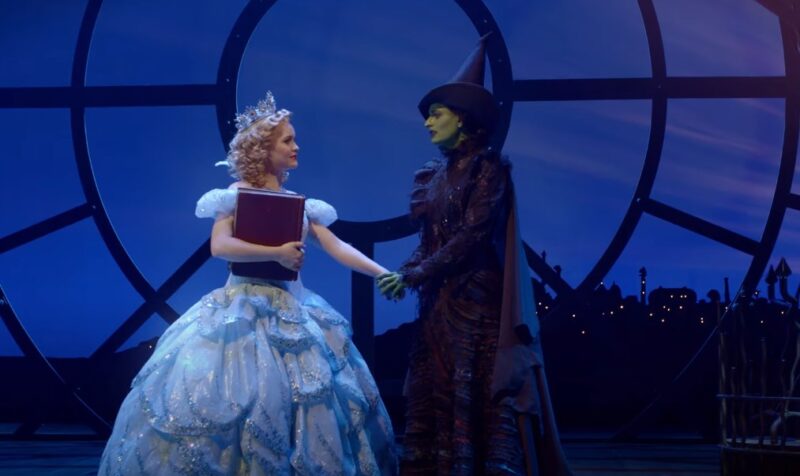Broadway: a word that instantly conjures images of dazzling lights, spectacular performances, and actors dedicating their lives to the art of theatre. But behind the curtain of this glamorous world, how do the financial realities play out for those who breathe life into the characters we adore?
Main Factors

The financial journey of a Broadway actor is influenced by numerous variables, from the role they play to the size of the production. Here, we will dissect the various elements that play a pivotal role in determining an actor’s paycheck, providing a glimpse into the complexity of their earning dynamics.
- Union Affiliations: Actors’ Equity Association (AEA) plays a crucial role in ensuring fair wages and working conditions for actors. Membership and adherence to union rules can significantly impact an actor’s earnings and overall career trajectory.
- Role and Production Size: From lead roles in large productions to smaller parts in off-Broadway shows, the scale and nature of the role can cause a substantial fluctuation in earnings.
- Experience and Notoriety: A seasoned actor or a well-known name can command higher pay, leveraging their experience and fan base.
A Closer Look
While the glamour of Broadway often steals the main focus, the financial aspects are equally riveting and multifaceted. However, it is important to understand the financial aspect as well.
- Salary Breakdown: Understanding the weekly salary, additional benefits, and potential bonuses that actors might receive provides a comprehensive view of their financial world.
- Disparities and Challenges: Despite the seemingly lucrative nature of the industry, many actors face financial challenges and disparities, which we will explore in this section.
Financial Terms for Leading Actors

The leading actors, often under the brightest spotlights, have financial narratives that are both intriguing and multifaceted. Their earnings, often speculated upon by the public, are influenced by a myriad of factors, from box office sales to their established reputation.
Lead actors, especially those with a well-established reputation or celebrity status, often have a different financial narrative from their lesser-known counterparts. Their ability to draw crowds and generate ticket sales can significantly impact their earning potential and contract negotiations.
- Negotiating Power: Renowned actors often have the leverage to negotiate higher salaries and potentially profit-sharing models, especially if their name is pivotal in driving ticket sales.
- Sponsorships and Additional Earnings: Beyond the stage, leading actors often have opportunities to augment their income through sponsorships, merchandise, and other ventures.
The Economic Impact of Star-Led Productions
Productions that boast of star actors often have a unique economic ecosystem. The financial dynamics of such shows, especially in terms of ticket pricing, budget allocation, and revenue generation, are pivotal in understanding the broader economic impact on the actors involved.
- Ticket Pricing and Sales: Star-led productions often command higher ticket prices and, consequently, have a different revenue generation model, impacting the overall financial distribution among the cast.
- Budgeting and Expenditure: The presence of a star actor can influence the production’s budgeting and expenditure, especially in aspects related to marketing, promotions, and production quality.
Ensemble and Understudies

Ensemble members and understudies, while not always in the direct limelight, play crucial roles in the seamless execution of a Broadway show. Their financial narratives, often less discussed, provide a rich insight into the diverse economic tapestry of the Broadway world.
Ensemble Earnings
Ensemble members, providing depth and richness to every performance, have a financial narrative that is both harmonious and complex.
Their earnings, often standardized to some extent, are influenced by various factors, including show type, duration, and contractual elements.
- Standardized Pay and Bonuses: Ensemble members often have a more standardized pay structure, with additional bonuses and benefits that are crucial to understanding their overall financial picture.
- Job Security and Consistency: The nature of ensemble work, in terms of job security and consistent employment, provides a different financial stability perspective in the often turbulent Broadway industry.
Understudies
Understudies, always ready to step into another actor’s shoes at a moment’s notice, have a unique and often under-explored financial narrative.
Their earnings and contracts, designed to compensate for their readiness and versatility, are pivotal in understanding the broader financial dynamics of Broadway.
- Compensation for Readiness: Understudies are compensated not only for their performances but also for their perpetual readiness to perform, providing a unique financial dynamic.
- Balancing Act: Juggling between being an understudy and potentially having other roles within the production provides a complex and multifaceted financial and professional dynamic.
Data-Driven Insights

The average Broadway Actor salary in New York is over $72.000, but the range typically falls between $59,000 and $88,000.
Salary ranges can vary widely depending on various important factors, including education, certifications, additional skills, and the number of years spent in the profession.
Actors’ Earnings
The current minimum salary for an Equity performer on Broadway is $2,400 a week. However, this figure can increase depending on the particular demands of any given track.
For instance, a chorus role or specialty adds $25 per hour to that weekly minimum, which is more or less standard across the board for Broadway ensembles these days. Understudying roles also comes with additional pay.
Swings, who understudy multiple ensemble tracks, earn $116 over the performer minimum, or $20 per hour if a performer is only a partial swing.
Understudying principal roles can add $60 per hour to the weekly salary, while understudying chorus roles adds $17.50.
Musicians and Stage Managers

The base weekly salary for a stage manager working on a Broadway musical is around $4,000 a week, and close to $3,500 for a play. Assistant stage managers make a minimum of $3,165 weekly for a musical and $2,800 for a play.
Some musicals also have a second assistant stage manager, who gets a minimum weekly salary of $2,645. Musicians, on the other hand, navigate through a different financial landscape.
The weekly wage for a Broadway musician is slightly over $2,000. If a musician performs on multiple instruments, each additional instrument increases their base salary.
The first addition earns the player $260 extra a week, with $130 more for each additional instrument played. The base weekly salary for a conductor on Broadway is $3,750 and their associate conductor makes a minimum of $2,750. .
Challenges in Keeping Financial Stability
The financial stability of Broadway professionals is often a delicate balance between pursuing artistic passions and managing economic sustainability.
- Financial Planning and Management: The importance of financial planning and management, especially considering the variable nature of Broadway earnings, is pivotal in ensuring long-term stability and sustainability.
- Dealing with Challenges: From show cancellations to industry strikes, managing through financial challenges is an integral part of a Broadway professional’s journey.
- External Effects: Understanding how the earnings of Broadway professionals ripple through various sectors, from housing to retail, provides a comprehensive view of its broader economic impact.
- Sustainability and Growth: Exploring how the financial health of Broadway professionals influences the sustainability and growth of the industry provides insights into the future trajectory of Broadway.
The Future of Broadway

As the curtains fall and the audience erupts into applause, the financial narratives of Broadway professionals continue to evolve. Also, if you are planning to visit this show, you should choose a proper outfit.
The future, influenced by technological advancements, economic shifts, and cultural changes, holds a new set of challenges and opportunities for those who bring stories to life on stage.
Adapting to Change
The future of Broadway earnings is set to be influenced by various factors, from technological advancements to shifts in consumer behavior.
Adapting to these changes, while maintaining financial stability, will be pivotal in navigating through the future landscape of Broadway.
- Technological Impact: From virtual performances to digital platforms, understanding how technology will influence earnings and revenue streams is crucial in adapting to the evolving Broadway landscape.
- New Opportunities: Exploring new opportunities, from global collaborations to diversified revenue streams, will be integral in shaping the future financial narratives of Broadway professionals.
Ensuring Equity and Fairness

Ensuring equity and fairness in earnings among Broadway professionals is crucial in fostering a sustainable and inclusive industry.
As we step into the future, addressing disparities and promoting equitable practices will be pivotal in shaping an industry that celebrates and supports all its members.
- Addressing Disparities: Understanding and addressing the disparities in earnings among various groups within the Broadway community is crucial in fostering equity and inclusivity.
- Advocacy and Change: Promoting advocacy and implementing changes that ensure fair and equitable earnings for all will be integral in shaping a just and supportive Broadway industry.
FAQs
How do Broadway actors manage financial stability during off-seasons or breaks between shows?
Many Broadway actors engage in various activities during off-seasons or breaks to manage financial stability. This might include taking on film or television roles, teaching acting workshops, performing in regional theater or touring productions, or even exploring opportunities outside of acting, such as writing or directing. Some actors might also explore completely different temporary career paths or freelance gigs to maintain financial stability when not performing on Broadway.
Are there any financial support programs available for Broadway actors during times when they are not working?
Yes, there are several financial support programs and resources available for Broadway actors during their times of need or when they are not working. Organizations like The Actors Fund provide emergency financial assistance, affordable housing, health care, and insurance counseling, and career development to actors and other performing arts professionals. Additionally, unions like Actors’ Equity Association offer various resources and support to their members.
How does the length and popularity of a Broadway show affect the salaries of the actors involved?
The length and popularity of a Broadway show can significantly impact actors’ salaries. A long-running and popular show may provide more stable and potentially higher income for actors due to its financial success and the ability to draw in consistent audiences. In contrast, actors involved in shorter, less popular shows might face more financial instability due to shorter employment periods and potentially lower ticket sales.
How do Broadway actors handle health insurance and other benefits?
Broadway actors often receive health insurance and other benefits through their union, Actors’ Equity Association, which negotiates health, pension, and various other benefits on behalf of its members. Actors earn weeks of work to qualify for health insurance, and the number of weeks worked correlates with the level of health coverage they receive. Additionally, some actors might explore alternative or supplementary insurance options, especially during periods when they are not performing.
What impact has streaming and digital performances had on Broadway actors’ earnings?
Streaming and digital performances have opened up new avenues for revenue and exposure for Broadway actors, especially during times when live performances are not feasible, such as during the COVID-19 pandemic. Actors may receive additional pay for digital performances, and these platforms can also provide them with opportunities to reach global audiences. However, the financial dynamics of digital performances can vary and are influenced by factors like contracts, production budgets, and platform revenue models.
Summary
While there are some challenges that these performers are facing in recent years, they manage to maintain popularity due to their uniqueness. Realizing that not all of them are paid like popular stars can be an additional motivation to check some of these spectacular shows.

